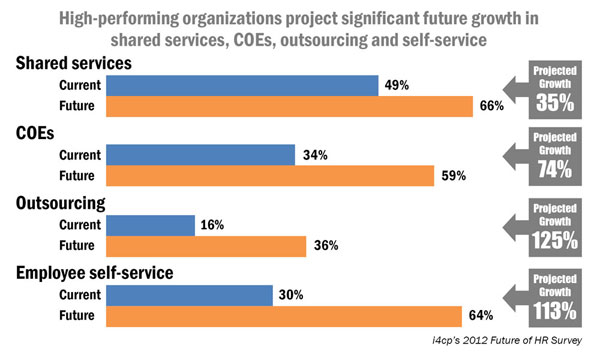
Seize the Day, HR
"How many HR people go to a division president when sales are down and ask, ‘Are we organized right? Do we have the right people in the right jobs? Is our reward system working? Should we try something else?' Not very many. Because we are not proactive, we're reactive. As a function, there are very few HR people who are out in front of the business."
Those remarks, made by one of the senior HR leaders i4cp interviewed and surveyed for its upcoming report, The Future of HR: The Transition to Performance Advisor, reflect the executives' collective opinion that it's time for change in HR. HR can demonstrate the value it can contribute by becoming an advisor to the business - one that is capable of defining strategies that leverage human capital to improve business performance.
But HR can step fully into that performance advisor role only if other variables change. The i4cp report examines a number of those factors, beginning with HR's continuing struggle to overcome perceptions of the function as a largely tactical one.
Larry Myers, SVP of HR at T-Mobile, says "Companies that understand the impact that sophisticated, top-quality HR organizations and professionals can have, automatically gain strategic and business advantage. Their executive teams would not think of making a step strategically without involving HR."
Yet the opposite remains true in many companies, especially lower-performing firms. Those organizations "view people as costs," Myers told i4cp. They "see HR as a necessary evil, an administrative function to minimize operating expenses. They don't ask for HR's input."
Perceptions of HR must change
The Future of HR study identified multiple factors that color perceptions of HR. An SVP of HR in an international construction and engineering company blames the "economy-inspired drive to be lean" for shifting focus to the more transactional aspects of the function. In addition, recent i4cp research points out contrasting viewpoints separating HR and non-HR professionals:

Definition issues - what is or is not "strategic" - can cloud perceptions of HR's contributions, as can the function's lack of self-promotion.
Dominique Ben Dhaou, SVP of HR at SGS, confirms that "HR people aren't always good at explaining what their competencies are or what they can contribute to the business. If top managers don't understand what HR could be doing to help the business, chances are they will not challenge HR to get what they need. [Consequently,] people won't think of HR as valuable contributors to business growth through human capital solutions."
Senior HR leaders interviewed for the Future of HR study pointed out another issue that sometimes holds HR back: Because tactical and administrative tasks have traditionally been backbone activities of the function, some HR practitioners have difficulty stepping outside that transactional comfort zone. Or even wanting to do so.
What does it take to change perceptions and affect business performance?
HR leaders share strategies for progress
If HR professionals are to think and act as performance advisors to the business, they need time to be strategic. If that sounds fundamental, it is. Paul Humphries, EVP of HR and president, medical, automotive and aerospace at Flextronics, explains how HR can get started: "Moving transactional work to a shared services center is part of the effort. So is implementation of a more extensive HR information system. It's having the objective of supporting the business, putting the organization and skills in place to do that, and then taking the other work away."
Kelly Services' SVP of HR, Nina Ramsey, agrees, advising CHROs to "streamline all the administrative and bureaucratic activity you can ... to free up your HR resources to be the business partners they need to be." To move that HR business partner front and center in a performance-advisor role, HR must restructure its work. The i4cp study revealed how successful CHROs are doing that.
HR leaders in high-performance organizations advocate expanded use of shared services, centers of excellence, outsourcing and employee self-service capabilities - all aimed at freeing HR from the time-intensive daily grind of transactional work.

Freeing HR's time to engage in more strategic efforts is only part of the equation, as Humphries pointed out. Providing support and value for the business must be firmly established as HR's core focus. In addition, HR professionals must be equal to the knowledge and skill demands of providing strategic value by acting as performance advisors to the business.
Becoming true performance advisors will require HR professionals to combine in-depth business savvy with the ability to closely counsel business leaders, accurately diagnose business challenges and formulate innovative human capital solutions. Some HR business partners may possess those attributes already, but significant work lies ahead to find and build the professionals needed to reshape HR functions on a widespread basis.
Shifting HR's structure to maximize efficiency, and moving a more informed and capable business partners into place are two of the elements that figure into HR's ability to overcome negative perceptions and transition strategically. Another of the half-dozen key areas the i4cp study examined is evolution in the role of line managers.
"It's the manager's responsibility to manage the relationship with each one of his or her employees," says Karla Gehlen, EVP of HR at Sterling Bank. "HR is there to help managers be the best managers of people they can be."
Indeed, i4cp research confirms that line managers' involvement in multiple aspects of talent management correlates with market performance. HR can directly contribute to that bottom-line value by delivering the tools, techniques, training and other support needed to make line managers effective talent managers. When combined with a commitment to hold managers accountable for developing and ensuring the success of their people, the line-manager-backed-by-HR approach becomes a powerful component in overall organizational performance.
Re-imagined structure, evolving roles, relevant competencies and other core elements are driving HR's transition to strategic performance advisor. i4cp's The Future of HR: The Transition to Performance Advisor explores the expansive change already underway. Carpe diem, HR?
